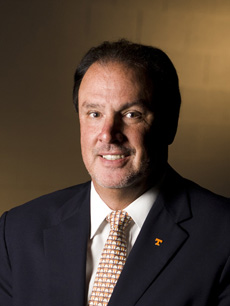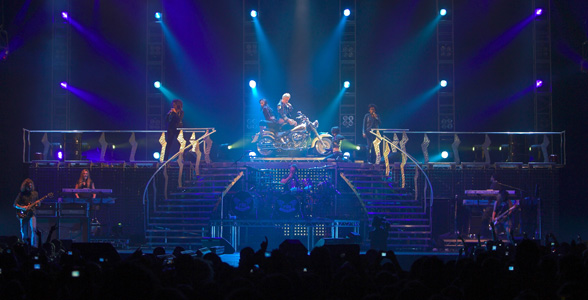By Diane Ballard
On a sweltering August afternoon in 1976, Mike Strickland wrapped up a show with Loretta Lynn and Conway Twitty and headed for a dim, cool lounge in Las Vegas’s Aladdin Hotel to grab a sandwich. His plans for a solitary respite were quashed by a long-haired, down-at-the-heels singer Strickland recognized from somewhere in the past. The guy accosted Strickland—who was making a name for himself as a lighting guy for stage shows even though he was still a UT student—-yammering about his plans to become the next big country music star. Strickland’s good -Tennessee upbringing forced him to listen politely, but his UT business training was yelling a strong “uh-uh.” The guy wouldn’t stop. He’d mapped out his future and it included a lot of time on stage under bright lights. He dogged Strickland through lunch and for months to come, until finally the Bandit Lites founder relented and set up the wannabe star with a small truck and a rudimentary stage lighting rig. To Strickland’s absolute amazement, six months later, he found himself at the flashy premiere of the guy’s world tour. Kenny Rogers was a megastar, Knoxville-based Bandit Lites supplied the illumination, and Strickland had a friend and client for life.
Now it’s 2011. Strickland and Bandit have lit everyone from Rogers to Alice Cooper to London Fashion Week to the reopening of Ayres Hall (the last at no charge). Bandit reigns as the Rolls Royce of the world lighting industry. It’s still based in Knoxville, but offices in London, Taiwan, San Francisco, Nashville, and Hong Kong extend the company’s reach worldwide. Strickland’s still the same guy who spent sixteen years on the road, lighting up a concert in a different city every night. But now he has hundreds of employees who do that. He’s the CEO, the man with the expensive suits and the personalized photos of Alan Jackson and Jimmy Buffet on his office walls. He’s got every reason to kick back and wallow in success, but he hasn’t played that kick-back card; it’s buried way down in the deck. He’s frenetically involved in volunteer work, especially on behalf of UT. And he’s guiding a transition to new technologies that will shape not only Bandit’s future but also the future of the entire lighting industry. Just like when he did his first lighting gig at age twelve, “It’s not about the money. It’s about the challenge.”
 The oft-told story of Strickland’s early entry into the world of work bears repeating, even if just for its shock value. He says he was simply looking to get into concerts free when he offered to set up a few lights for the Beach Boys in Kingsport in 1968. He knew a bit about stage lighting, having been involved in community theater since early childhood. In fact, it was the community theater’s lights he offered the Beach Boys. In addition to chutzpah going for him, Strickland was a tall preteen who looked older than his scant twelve years. Concert lighting was in its infancy, Strickland recalls, so even though he had a lot to learn, so did the performers.
The oft-told story of Strickland’s early entry into the world of work bears repeating, even if just for its shock value. He says he was simply looking to get into concerts free when he offered to set up a few lights for the Beach Boys in Kingsport in 1968. He knew a bit about stage lighting, having been involved in community theater since early childhood. In fact, it was the community theater’s lights he offered the Beach Boys. In addition to chutzpah going for him, Strickland was a tall preteen who looked older than his scant twelve years. Concert lighting was in its infancy, Strickland recalls, so even though he had a lot to learn, so did the performers.
The Beach Boys agreed to his price (twenty-five dollars), and so did the next band that passed through Kingsport. Most concerts were on weekends, so Strickland was able to do the lighting gigs and still keep up his schoolwork. In quick succession, he found himself lighting Paul Revere and the Raiders and the Monkees. Problem was, they would ask him to light shows at their next tour stops, such as Asheville and Charlotte. He couldn’t drive, so he hired an older friend to transport him—and the community theater’s lights—to distant venues. Several friends joined him as the original Bandits. The name Bandit came from the fact that the lights were borrowed from theaters and schools. Strange as it may seem, during his junior-high and high-school years, Strickland lit up some of the best known US acts—the Four Seasons, Mitch Ryder and the Detroit Wheels, the Grassroots, B. J. Thomas, and Kris Kristofferson.
When he came to UT in the early ’70s, the business came with him.
“I lived in Reese Hall, and I ran a wire off the hall phone into my room and attached an answering machine with a message that said ‘Bandit Lites. We’re not available right now but leave your name and number and we’ll call you back.’”
Strickland made enough money to buy his own lights, and the acts kept calling—Blue Oyster Cult, Conway Twitty, Loretta Lynn, Merle Haggard, Dr. Hook. “I was on the road more than in class,” he admits.
He got to class often enough to absorb quite a lot from his business administration major. He says he immediately put to use the accounting and marketing lessons as he grew Bandit Lites. He graduated in 1977, then went on to law school at UT. His knowledge of the law also has stood him in good stead during the years of growing his business. And grow it, he has. Bandit expanded to Nashville and London in the 1980s and to San Francisco and China in the 1990s. Meanwhile the scope of Bandit’s work exploded to include not only more and more acts—Aerosmith, R.E.M., Garth Brooks, Jimmy Buffet, Pink, Christina Aguilera, Alan Jackson, Alice Cooper, and Tim McGraw to name but a few—but also festivals, TV, films, and more.
With the business thriving, Strickland became more introspective. “I noticed I wasn’t helping [the community]. I didn’t have any philanthropic involvement.” That situation was quickly remedied. He became involved with UT, where he serves on the Development Council and leads the College of Business Administration’s portion of the $1-billion Campaign for Tennessee. Bandit lights many UT events without charge, including commencements and sports events. Strickland is generous in his praise for the university: “Everything I know I learned either as a UT student or while volunteering for the university.” He is a self-described “fanatic” about promoting Knoxville and East Tennessee and serves as chair of the Knoxville area Chamber of Commerce. One of his career high points came in 1999 when CNN/USA Today named Strickland Entrepreneur of the Year, a distinction previously awarded to Bill Gates and Michael Dell.
A cornerstone of Strickland’s business philosophy is treating employees well. He coined the term humanomics—business planning based on concern for people. Even during the recent recession, Bandit continued to pay 100 percent of employee health insurance and to match 401(k) contributions dollar for dollar up to the IRS limit. The company sponsors family days and caters lunch for employees once a month. “A rising tide floats all boats,” he opines. “If I pay my people well and treat them fairly, they’ll work harder, and Bandit Lites will grow and get even better.” Bandit has about 300 full-time employees and 200 part-timers. Strickland estimates about fifty are UT graduates.
Strickland loves to speak to students in UT business classes.
“I tell them ‘You can do anything. If I can build the world’s leading lighting company in Knoxville, Tennessee, you can do anything.’”
At age fifty-five, Strickland already has worked more than forty years, longer than many people’s entire careers. But to him, it hasn’t been work. “I’ve never had a job,” he grins. “I’m in show business, and it’s fun.”
Technology Revolutionizes Lighting
You may not think of lighting as a high-tech endeavor, but you would be mistaken.
Bandit Lites, using technology developed at Oak Ridge National Laboratory, has pioneered sea changes in the industry, lighting the way to a greener future.
Bandit has put together the first LED lighting systems, used last year on tour by Jackson Browne and Crosby, Stills, and Nash. Garth Brooks’s benefit concert last December in Nashville, lit by Bandit, was the largest-ever assemblage of LEDs. The advantages? Less heat on stage, endless color varieties, 90 percent less electricity used, less cable needed, and less truck space needed, thus reducing fuel costs and emissions.
With carbon-fiber technology developed at ORNL, Bandit is bringing to market new lightweight stage rigging systems. Advantages: stronger components, fewer people required for assembly, quicker assembly, and less truck space needed for hauling.



